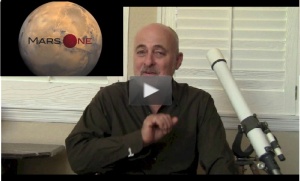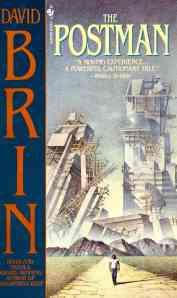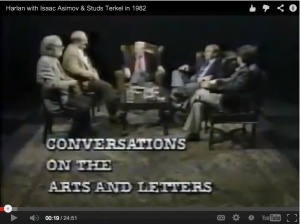By a posterity that manages to eke past our present stupidities in order to scale heights that we (their ancestors) can barely conceive. A destiny that we wish for our descendants even as too many nowadays proclaim it can never happen.
That is exploration, the true heart-essence of science fiction. And Iain Banks did it peerlessly well.
== Now pause for a little dangerous science ==

Tens of thousands have signed up as preliminary candidates for the
Mars One Project, aimed toward sending a high risk and one-way "first colony" to the Red Planet. This
NBC story gives an overview by profiling three applicants -- an 18 year old college student, a 71 year old retiree…
and yours truly. You can also view our 1 minute video sales pitches. In a year, the public may get a chance to help vote for the final team.
== Science fiction moving onward ==

Tune in as the inimitably unique Harlan Ellison, does
readings of two science fiction yarns, first bringing to fire and life "
Using it and losing it," by Jonathan Lethem... then narrating my own little intergalactic tale of stark fate and long range destiny -- "
Bubbles." But of course the star of the performance is Harlan's peerless showmanship.
Looking back....Read
In Praise of Pulp on Worlds Without End -- a reminiscence of E.E. "Doc" Smith, Isaac Asimov, Edgar Rice Burroughs, their wondrous stories and unforgettable covers.
Watch a vivid History Channel show
"Star Trek: Secrets of the Universe." I was one of the main blather-pundit fellows illuminating both scientific and dramatic themes of the wonderful Star Trek cosmos."
== The Next Generation of Science Fiction ==
The World Science Fiction Convention in San Antonio TX - LoneStarCon 3 - will host
Teaching Science Fiction, a workshop for teachers, librarians, and parents on how to use science fiction as a teaching tool (Monday, Sept 2). The workshop provides a half-day seminar on developing a class on science fiction for primary or secondary students. The target audience for this course is educators interested in designing a class on SF, or who want to incorporate SF readings into existing classes. No prior knowledge of the genre is assumed, and general audiences are welcomed. (Help spread the word to mid-Texas teachers and librarians and others!)

Support the
Clarion Write-a-thon -- to raise money for the Clarion Science Fiction and Fantasy Writer's Workshop at UCSD. Instead of miles walked or run...you can pledge to writers per words written, all for a good cause -- teaching the next generation of writers. You can even
pledge money for ME to write...chapters of my next uplift novel?
==Forward-Looking Science Fiction==
Earlier I wrote about how Iain Banks represented the rare optimistic wing of science fiction, showing repeatedly that you can have more and better adventure and ideas without always assuming the worst. This matter has been getting attention also from Neal Stephenson's
Project Hieroglyph that aims at encouraging a re-engagement of science fiction with positive thinking... though not always positive or happy endings. The distinction is simple: dark stories that actually engage the reader or viewer with a
unique or interesting failure mode are helpful, if they become "
self-preventing prophecies," stories that shock us into thinking, that gird us to
prevent the scenario portrayed. Listen to a
recent podcast of Neal Stephenson on Science Fiction, on Slate.

Greg Bear, Vernor Vinge and I are also part of this movement, and there was positive news lately when Kim Stanley Robinson's novel "
2312" won the Nebula Award with a tale of wonder and mixed hope.
Elsewhere I go into what I believe is the fundamental reason that so many authors and producers and directors go straight for the most dismal, civilization-hating and dystopia spreading messages they can find, too often portraying society and its institutions as useless and our fellow citizens as hopelessly foolish sheep. Not in order to skewer a failure mode and warn us, but out of simple plot-laziness.
"
The Idiot Plot" shows why even the
notion of civilization is treated with contempt, especially by Hollywood. You have to keep your heroes in jeopardy! But that need as evolved into a cheat... the blanket assumption that you can only create close-hero jeopardy by assuming the worst.
Alas.
==Brin-erisms==

My own contribution --
“Why jiltz poor wire-heads whose only tort is self-perving? Sure they're vice lice, but where's the fraction in evolution in action? I say let 'em un-breed themselves, and stop forcing therapy drugs on the pleasure-centered!” -- Oops! That's from the year 2038! (From my novel
EARTH (1989). SOme idea... offset a bit.
==Random Science Fiction and Science==
Researchers have found evidence of 10 Million tons of impact spherules that were deposited across four continents 12,800 years ago. (The same impact that is said to have ended the Clovis culture and extinguished many species of large mammal in North America.
My former student, Ron Drummond, performs an insightful and dramatic 40 minute reading of the semi-nonfiction/sf'nal "
The First Woman on Mars." Informative and vivid.
An expectant couple from North Carolina are currently in Hawaii awaiting the birth of their baby. When the time comes, they will have a so-called
dolphin-assisted birth. I have studied cetaceans for decades, visiting research centers and meeting them at sea, and this notions is one of the most crackpot I've seen.





